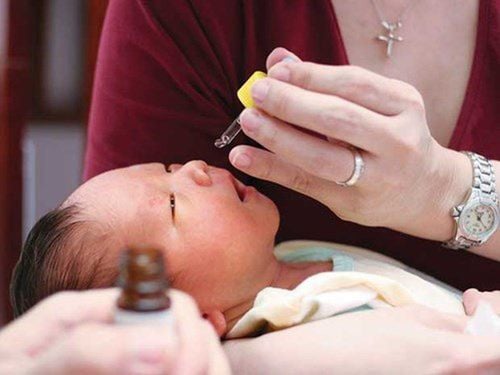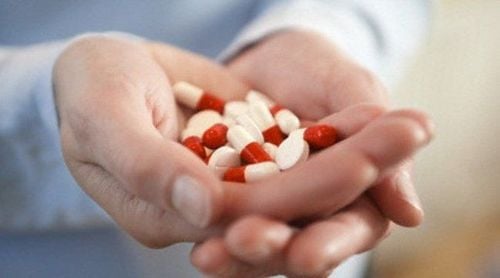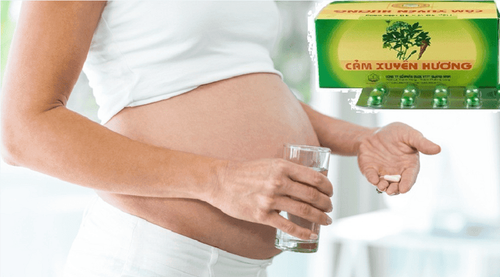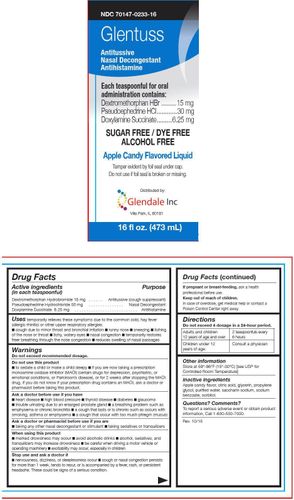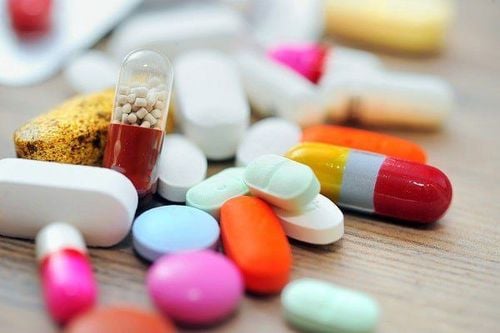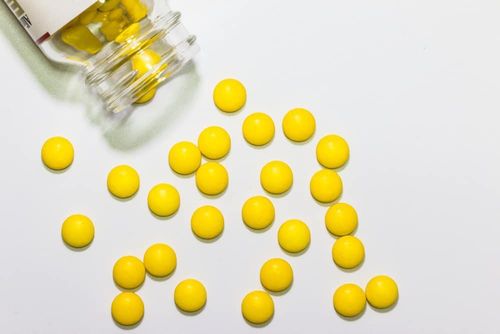This is an automatically translated article.
The article was consulted with Specialist Doctor I Nguyen Thi My Linh - Neonatologist - Department of Pediatrics - Neonatology - Vinmec Danang International General Hospital.A cold is a disease caused by a virus, most commonly seen in children. Children with colds need to be treated with simple things like getting enough rest and drinking plenty of fluids. In addition, a number of symptomatic medications can be used that are appropriate for the child's age according to the doctor's advice.
1. What to do when a child has a cold?
Children with a cold need to rest and drink plenty of fluids. This is a simple but very effective method. Drinking plenty of water and liquid foods thin the mucus, making it easier for them to drain.For example, to relieve cold symptoms in children, you can give them warm water/tea with honey (for children over 1 year), popsicles or chicken soup. In addition, a humidifier is also a good solution to reduce cold symptoms in children. Warm, humid air will help improve breathing and soothe a dry, sore throat.
If the child has a cold and the fever does not go down, should the child take cold medicine? The American Academy of Pediatrics recommends that cold medicine should not be used in children under 6 years of age. To limit the child's overdose, you should also carefully read the ingredients of the drug, because some types are not necessary for the child's symptoms.
Always ask your doctor or pharmacist if you have any questions about cold medicine for your child, and read the label carefully before giving your child an over-the-counter (OTC) medicine. 2. Does the child have a cold need to go to the hospital?

2. Does the child have a cold need to go to the hospital?
Usually, a cold goes away on its own without going to the doctor. Children with a cold need to go to the hospital when the following symptoms appear:Ear pain or discharge Fever over 40 degrees Celsius or lasts for more than 6 days Cold or cough lasts for more than 10 days Pale skin Wheezing, breathing rapid or difficult breathing Dehydration (signs include little or no urinating in 12 hours, cold skin, chapped lips) Extreme irritability Difficult to be awakened from sleep Convulsions Flu-like symptoms return with followed by fever and worsening cough Persistent, wet cough that does not respond to treatment MORE: Nasal drop poisoning in children: What to know
3. Decongestants in the treatment of colds for children
Nasal rinses in the form of water, gel, and spray are available in many pharmacies, and are as effective as chemical decongestants. It works to improve nasal congestion in children. However, parents should not let children use it for more than 2-3 days, otherwise it will increase nasal congestion.Some decongestants such as pseudoephedrine have side effects such as weight gain and difficulty sleeping. Therefore, parents should not use medicine for children before sleeping. However, this drug rarely lasts longer than 1-2 hours.
Nasal drops like Afrin are FDA approved for children 6 years of age and older. Neo-Synephrine is FDA approved for children 12 years of age and older. However, they are not recommended for use by children. They can also worsen congestion if used for more than 3 days.
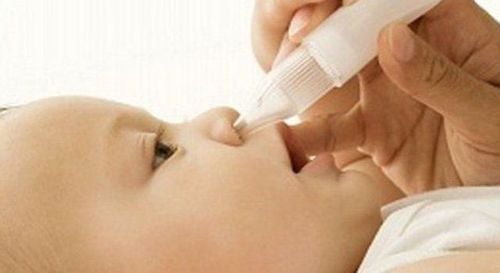
4. Antihistamines in the treatment of colds for children
Antihistamines are found in some cold medicines. They have the effect of drying mucus, reducing symptoms of congestion. However, they are not effective in treating viral diseases such as colds.In general, antihistamines can cause drowsiness and dry mouth, including diphenhydramine.
5. Cough medicine in cold treatment for children
An expectorant such as guaifenesin (Mucinex) can help thin mucus, making it easier for a child to cough. When giving medicine to children, it is necessary to give them a lot of water. However, there is little evidence that guaifenesin is effective in treating colds.Instead, you should use tea or warm water with lemon and honey, products that have been shown to be effective expectorants, helping to soothe a child's inflamed throat.
Breathing along with drinking plenty of water can also help loosen mucus. Be careful not to let the hot steam burn the child. Ask your pharmacist for specific instructions and advice.
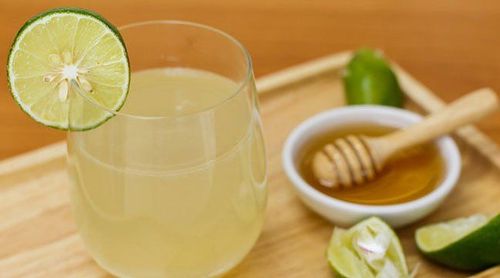
6. Cough suppressants in the treatment of colds for children
Cough suppressants are rarely a good solution to treating a cold, because coughing is the body's good response, helping the lungs clear mucus and viruses that cause colds in children.Although a cough response can make it difficult for a child to sleep at night, cough suppressants do not help clear mucus. Instead, give your child water to drink and turn on a humidifier in the room.
7. Other Treatments for Colds
Throat sprays are one way to soothe a child's sore throat. However, lozenges should not be used by children because they can cause choking.Pain relievers such as acetaminophen, ibuprofen, and naproxen can reduce fever and relieve aches and pains. You should consult your doctor about the right medicine for your child. Absolutely do not give aspirin to children because it increases the risk of Reye's syndrome.
If your child is old enough to understand how to blow his nose, don't forget to remind him to blow his nose often. There's no better way to get rid of mucus than that.
If your child can't blow his nose, you should use a nasal aspirator to suck up the mucus. Choose a nasal aspirator with a plastic tip and a rubber bulb. These tend to have better suction and are less irritating than the larger, all-rubber versions.
How to use the nasal aspirator: Suction each nostril 8-10 times in a row. If your child has a stuffy nose and can't get the mucus out, try putting 3-4 drops of saline in each nostril. Wait about 2 minutes and then start smoking again.
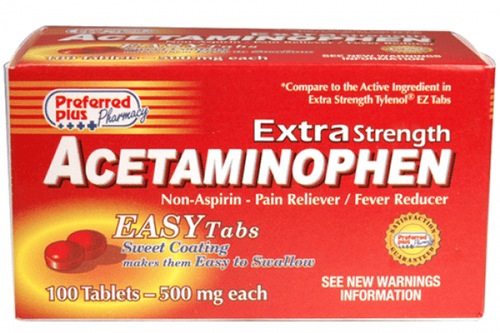
8. Advice when giving cold medicine to children
Avoid drug combinations such as expectorants/antihistamines or expectorants/cough suppressants as they have opposing effects. Antihistamines may not work for viruses, unless some of the symptoms are actually caused by allergies.Read drug labels carefully: Many cold medicines contain fever reducers and pain relievers like acetaminophen. You do not need a separate injection to relieve pain and fever. Otherwise, a "double dose" can be dangerous for the child. If your child has a stuffy or runny nose but isn't in pain, avoid pain relievers.
Strictly follow dosage recommendations, especially with infants. Talk to your pediatrician before you give any over-the-counter medicine to a child younger than 4 years old.
Consider using common cold medicines. They are cheaper, but have the same active ingredients as brand-name drugs. Furthermore, they may also contain only one ingredient, making it easier to treat specific symptoms without the need for a double dose.
Before giving cold medicine to a child, especially a young child, talk to your pediatrician or pharmacist to make sure the medicine is safe.
With many years of experience in examining and treating diseases in children, now the Pediatrics Department at Vinmec International General Hospital has become one of the major health care centers, capable of examining , screening and treatment of many specialized diseases in children. Therefore, if the child shows signs of a dangerous cold, parents can take the child to Vinmec International General Hospital for examination and receive support and advice from doctors and nutritionists.
Please dial HOTLINE for more information or register for an appointment HERE. Download MyVinmec app to make appointments faster and to manage your bookings easily.
Reference source: webmd.com





